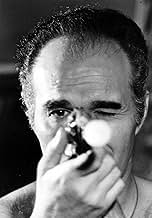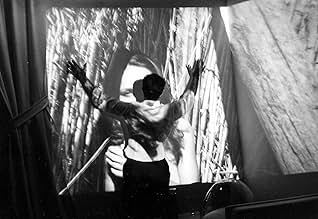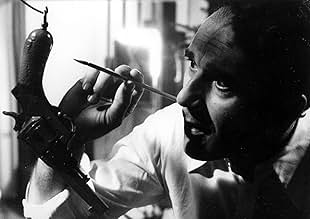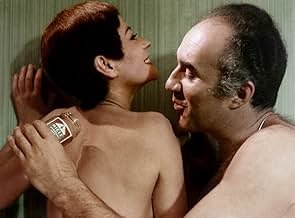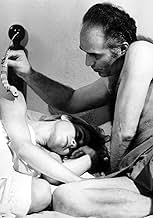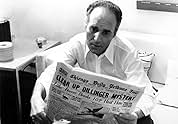IMDb RATING
6.9/10
2.9K
YOUR RATING
A man decides to cook for himself, but finds the revolver of John Dillinger hidden in his kitchen instead.A man decides to cook for himself, but finds the revolver of John Dillinger hidden in his kitchen instead.A man decides to cook for himself, but finds the revolver of John Dillinger hidden in his kitchen instead.
- Awards
- 1 win & 2 nominations total
Featured reviews
A well-off industrial designer, Glauco, comes back home and sees his wife who allegedly has a headache and rests in bed. She leaves him a cold dinner, lest Glauco should feel hungry. Nevertheless, Glauco chooses to prepare the meal on his own. While cooking, he discloses a gun wrapped in a newspaper which recounts events regarding a famous mobster Dillinger's demise
Whilst reading this paragraph, one is likely to scratch his head and reassure this is what the movie is genuinely about. This is no mistake – Dillinger is Dead is precisely a product of its time. A bold, weird and mesmerizingly original film which has more in common with existentialism and fantasy than Dillinger himself. The concept of merging reality with surrealism and transmuting it into an artistic manifestation is indubitably exquisite. Straightforwardly speaking, the story by Ferreri is an infant of sheer uniqueness and it stimulates one's senses. Despite the fact that the whole motion picture is virtually filmed solely in Glauco's apartment, Ferreri aptly lunges the plot and it consequently never drags or feels rushed. The characters existent in the flick sporadically encounter one another and the action generally revolves around Glauco. Neither does one get to know his past, nor his views on the outer world. Yet, his mental state is absolutely precise and visible inasmuch his soul is diaphanous owing to Ferreri's fantastic mise-en-scène which visualises Glauco's existential ennui by exposing his disparate acts in his home which serve totally nothing. The protagonist seems nearly a phantom creeping through ensuing chambers of his apartment. He desperately endeavours to do something, satisfy himself anyhow, still he is at a loss for options. His behaviour perpetuated on the celluloid consists of most probably his everyday activities. This enchantingly articulates the meaninglessness and pointlessness of his life. What is new in his life is the weapon wrapped in the mysterious newspaper which inscrutably appears in his apartment. Once he finds the gun, he gradually embarks on altering his life and this is the onset of his transformation which leads to the abrupt and outré denouement.
Mario Vulpiani's cinematography captures the infertility of Glauco's actions in an eye-pleasing manner and it's occasionally ravishing and co-operates with the soundtrack by Teo Usuelli duly. The performance by Michel Piccoli is very good, resembling his appearances in Bunuel movies in which he plays analogous roles. His minimalistic attitude is very appropriate and renders the character plausible.
While portraying existential ennui wasn't something ground-breaking and refreshing in 1969, what strikes in case of Dillinger is Dead is Ferreri's atypical execution of the material. Apart from being structurally quite precisely delineated and recounted, it's far from being a film reminiscent of Edward Munch's painting The Scream or Antonioni flicks. What one might behold here is a huge irony, enormous portions of dark humour and hilarious wickedness. Given that Ferreri was a leftist, it may be analysed as criticism of bourgeois class – filled with money, yet incapable of spending it on laudable aims or developing their interests since there are not such for them. Hence, the movie works well as a wicked depiction of pointlessness of human in modern society as well as a political and satirical manifesto. No matter how sophisticatedly one approaches Dillinger is Dead, it is a highly riveting piece of cinematographic extravaganza which ought to appeal to those seeking for something else and lovers of the sixties or art-house cinema, whereas all others should make allowances for the possibility that this slow-paced, somewhat plot less quirk might be emotionally insufficient and boring as well as possibly exasperating for some.
Whilst reading this paragraph, one is likely to scratch his head and reassure this is what the movie is genuinely about. This is no mistake – Dillinger is Dead is precisely a product of its time. A bold, weird and mesmerizingly original film which has more in common with existentialism and fantasy than Dillinger himself. The concept of merging reality with surrealism and transmuting it into an artistic manifestation is indubitably exquisite. Straightforwardly speaking, the story by Ferreri is an infant of sheer uniqueness and it stimulates one's senses. Despite the fact that the whole motion picture is virtually filmed solely in Glauco's apartment, Ferreri aptly lunges the plot and it consequently never drags or feels rushed. The characters existent in the flick sporadically encounter one another and the action generally revolves around Glauco. Neither does one get to know his past, nor his views on the outer world. Yet, his mental state is absolutely precise and visible inasmuch his soul is diaphanous owing to Ferreri's fantastic mise-en-scène which visualises Glauco's existential ennui by exposing his disparate acts in his home which serve totally nothing. The protagonist seems nearly a phantom creeping through ensuing chambers of his apartment. He desperately endeavours to do something, satisfy himself anyhow, still he is at a loss for options. His behaviour perpetuated on the celluloid consists of most probably his everyday activities. This enchantingly articulates the meaninglessness and pointlessness of his life. What is new in his life is the weapon wrapped in the mysterious newspaper which inscrutably appears in his apartment. Once he finds the gun, he gradually embarks on altering his life and this is the onset of his transformation which leads to the abrupt and outré denouement.
Mario Vulpiani's cinematography captures the infertility of Glauco's actions in an eye-pleasing manner and it's occasionally ravishing and co-operates with the soundtrack by Teo Usuelli duly. The performance by Michel Piccoli is very good, resembling his appearances in Bunuel movies in which he plays analogous roles. His minimalistic attitude is very appropriate and renders the character plausible.
While portraying existential ennui wasn't something ground-breaking and refreshing in 1969, what strikes in case of Dillinger is Dead is Ferreri's atypical execution of the material. Apart from being structurally quite precisely delineated and recounted, it's far from being a film reminiscent of Edward Munch's painting The Scream or Antonioni flicks. What one might behold here is a huge irony, enormous portions of dark humour and hilarious wickedness. Given that Ferreri was a leftist, it may be analysed as criticism of bourgeois class – filled with money, yet incapable of spending it on laudable aims or developing their interests since there are not such for them. Hence, the movie works well as a wicked depiction of pointlessness of human in modern society as well as a political and satirical manifesto. No matter how sophisticatedly one approaches Dillinger is Dead, it is a highly riveting piece of cinematographic extravaganza which ought to appeal to those seeking for something else and lovers of the sixties or art-house cinema, whereas all others should make allowances for the possibility that this slow-paced, somewhat plot less quirk might be emotionally insufficient and boring as well as possibly exasperating for some.
Wealthy, middle-aged gas-mask maker Michel Piccoli (as Glauco) arrives home late from work and finds his beautiful blonde wife in bed with a headache. While she blows kisses to her goldfish, Mr. Piccoli rejects the dinner she left and decides to make a hot gourmet meal. Gathering ingredients, Mr. Piccoli opens a closet door and some poorly-stacked newspapers fall out onto the floor. Restacking the items, Piccoli finds an unexpected object wrapped in a newspaper containing an article on the death of 1930s US gangster John Dillinger. This is where director Marco Ferreri derives "Dillinger Is Dead" as a title. Piccoli is intrigued by his newspaper discovery and it ends up changing his life...
Mr. Ferreri and Piccoli appear to be having fun with this arty film. They may have been having a little too much fun. It starts out with some rather explicit references to a theme. You could call it "the alienation of modern man," and Ferreri does appear to be naming that as his thesis. Later, it veers perilously close to a mid-life crisis. The protagonist is difficult to identify with; possibly, he's too bourgeois. Some scenes move as slow as molasses or, as you'll see, honey. A "finger dance" segment enlivens an otherwise dull portion; it's pointless, but that's what fingers do. This viewer narrowed it down to two options for Glauco, considering his discovery. Not sure he made the best choice.
****** Dillinger Is Dead (1/23/1969) Marco Ferreri ~ Michel Piccoli, Annie Girardot, Anita Pallenberg, Gino Lavagetto
Mr. Ferreri and Piccoli appear to be having fun with this arty film. They may have been having a little too much fun. It starts out with some rather explicit references to a theme. You could call it "the alienation of modern man," and Ferreri does appear to be naming that as his thesis. Later, it veers perilously close to a mid-life crisis. The protagonist is difficult to identify with; possibly, he's too bourgeois. Some scenes move as slow as molasses or, as you'll see, honey. A "finger dance" segment enlivens an otherwise dull portion; it's pointless, but that's what fingers do. This viewer narrowed it down to two options for Glauco, considering his discovery. Not sure he made the best choice.
****** Dillinger Is Dead (1/23/1969) Marco Ferreri ~ Michel Piccoli, Annie Girardot, Anita Pallenberg, Gino Lavagetto
Dillinger is Dead (Dillinger e Morto) is a Marco Ferreri film. I just saw the film in a very good print at the Museum of Modern Art in New York, and this is a film that benefits from being seen in a cinema where there are less distractions, and a film of this pace and sensibility has a better chance of seizing you and bringing you into its unique and power logic.
The film, in my estimation, is a meditation on alienation in a period of increasing mass media saturation. The film artfully weaves in a multitude of media moments, including television, home movies, radio, records, newsreels, and newspapers. At a certain point in watching the film, I deeply appreciated how Ferreri forces us to consider not only his character's relationship to media, but our own relationship to media. In his most expressive audio-visual moments, this film moves away from any standard narrative formula into a subjective exploration of the power of cinema and its affect on our psyche and our actions. At those moments, the film is visually mesmerizing, sonically engaging and psychologically intimate. One scene of a projected home movie on the wall of his living room is one of the best sequences of its sort that I have ever seen.
This film opens with Glauco (Michel Piccoli) at his job, testing gas masks. The conversation between Glauco and one of his co-workers that opens the film highlights the theme of alienation, and the film right from the beginning establishes a tone that engages the fate of man in a society of the spectacle.
The film then takes place over one night in the life of Glauco. We watch as he comes home and spurns a dinner that is waiting for him. He goes upstairs to his bedroom, where he has a brief, though telling, encounter with his wife, played by Anita Pallenberg. The bedroom scene begins to establish the basic strategy of Ferreri's film. There is very little dialog between Glauco and his wife (In fact, there is very little dialog in the film at all, it verges on being an almost non-dialog driven film). Instead, we, in the audience, bare witness to their interaction, and our feelings of what we are seeing are impacted by source music emanating from a radio that Glauco's wife is listening to (Most, thought not all, of the music used in the film is produced by known sources seen in the film). The music in the scene is mostly contemporary Italian pop music and American pop music. The songs lend an interesting narrative counterpoint to this scene (and is true in other scenes as well), as the music is usually expressive of the unspoken feelings and emotions between Glauco and his wife. When Glauco goes back downstairs, he begins to prepare his own meal, which actually turns out to be quite a production. When Glauco goes searching for a particular spice, he accidentally knocks down a stack of old magazines in the spice closet, and a mysterious package, wrapped in newspaper, spills onto the floor. In one of Ferreri's most deft storytelling touches, the content of that package and Glauco's reaction to it, becomes a structuring element for this film. But it is clear that Ferreri's passion here is not some genre formula film, rather the film is an essayistic exploration of alienation, told through a seemingly simple night in the life of Glauco.
The performances in this film are uniformly excellent, beginning with Piccoli's lead performance that carries the film. Pallenberg isn't given much screen time, but she does a good job in a limited part. But Glauco's maid, played by Annie Girardot, has a couple of great scenes that add a juicy spark to this tale.
In fact, while the film does move in its own way towards a conclusion, I found a short moment when Glauco stops in front of a poster celebrating Italian Futurists to be very telling of Ferreri's intentions. The Futurists were obsessed with speed, and modernity, and cinema, and their manifestos would hold much appeal for a character such as Glauco. But it is clear in Dillinger is Dead how much has changed since the 1930s when modernity seemed to hold unchecked promises. By the end of the 1960s, that type of Utopian celebration of modernity was no longer as easy to summon. The society of the spectacle was beginning to encroach on all aspects of everyday life, and in a character like Glauco, in the depths of his alienation, we see that the line between fantasy and reality in our culture was already well on its way to eroding by the end of the 1960s.
The film, in my estimation, is a meditation on alienation in a period of increasing mass media saturation. The film artfully weaves in a multitude of media moments, including television, home movies, radio, records, newsreels, and newspapers. At a certain point in watching the film, I deeply appreciated how Ferreri forces us to consider not only his character's relationship to media, but our own relationship to media. In his most expressive audio-visual moments, this film moves away from any standard narrative formula into a subjective exploration of the power of cinema and its affect on our psyche and our actions. At those moments, the film is visually mesmerizing, sonically engaging and psychologically intimate. One scene of a projected home movie on the wall of his living room is one of the best sequences of its sort that I have ever seen.
This film opens with Glauco (Michel Piccoli) at his job, testing gas masks. The conversation between Glauco and one of his co-workers that opens the film highlights the theme of alienation, and the film right from the beginning establishes a tone that engages the fate of man in a society of the spectacle.
The film then takes place over one night in the life of Glauco. We watch as he comes home and spurns a dinner that is waiting for him. He goes upstairs to his bedroom, where he has a brief, though telling, encounter with his wife, played by Anita Pallenberg. The bedroom scene begins to establish the basic strategy of Ferreri's film. There is very little dialog between Glauco and his wife (In fact, there is very little dialog in the film at all, it verges on being an almost non-dialog driven film). Instead, we, in the audience, bare witness to their interaction, and our feelings of what we are seeing are impacted by source music emanating from a radio that Glauco's wife is listening to (Most, thought not all, of the music used in the film is produced by known sources seen in the film). The music in the scene is mostly contemporary Italian pop music and American pop music. The songs lend an interesting narrative counterpoint to this scene (and is true in other scenes as well), as the music is usually expressive of the unspoken feelings and emotions between Glauco and his wife. When Glauco goes back downstairs, he begins to prepare his own meal, which actually turns out to be quite a production. When Glauco goes searching for a particular spice, he accidentally knocks down a stack of old magazines in the spice closet, and a mysterious package, wrapped in newspaper, spills onto the floor. In one of Ferreri's most deft storytelling touches, the content of that package and Glauco's reaction to it, becomes a structuring element for this film. But it is clear that Ferreri's passion here is not some genre formula film, rather the film is an essayistic exploration of alienation, told through a seemingly simple night in the life of Glauco.
The performances in this film are uniformly excellent, beginning with Piccoli's lead performance that carries the film. Pallenberg isn't given much screen time, but she does a good job in a limited part. But Glauco's maid, played by Annie Girardot, has a couple of great scenes that add a juicy spark to this tale.
In fact, while the film does move in its own way towards a conclusion, I found a short moment when Glauco stops in front of a poster celebrating Italian Futurists to be very telling of Ferreri's intentions. The Futurists were obsessed with speed, and modernity, and cinema, and their manifestos would hold much appeal for a character such as Glauco. But it is clear in Dillinger is Dead how much has changed since the 1930s when modernity seemed to hold unchecked promises. By the end of the 1960s, that type of Utopian celebration of modernity was no longer as easy to summon. The society of the spectacle was beginning to encroach on all aspects of everyday life, and in a character like Glauco, in the depths of his alienation, we see that the line between fantasy and reality in our culture was already well on its way to eroding by the end of the 1960s.
5pvsp
First i have to say, I didn't like this movie. Too "sixties" for me. During this years of fear, confusion ans sex liberation there were tons of experimental movies. This is one of them. So, if you like solid scripts and action, get way from this film.
This film is an experience like a David Lynch movie, very hypnotic and seducing if you are caught in it.
It's also a sequel - or a reply - to Jean-Luc Godard's "Le Mepris". First, there's Piccoli (sometimes he's dressed the same as in "Le Mepris") and there are many scenes who work as an echo of Godard's movie (the arguing scene, the jump in the sea...) Like a french critic said "Dillinger" is like "Le Mepris" with Brigitte Bardot on the first floor sleeping.
So, not a film as experimental and "destroy" as it seemed at first look. Unusual for sure but worth a look.
This film is an experience like a David Lynch movie, very hypnotic and seducing if you are caught in it.
It's also a sequel - or a reply - to Jean-Luc Godard's "Le Mepris". First, there's Piccoli (sometimes he's dressed the same as in "Le Mepris") and there are many scenes who work as an echo of Godard's movie (the arguing scene, the jump in the sea...) Like a french critic said "Dillinger" is like "Le Mepris" with Brigitte Bardot on the first floor sleeping.
So, not a film as experimental and "destroy" as it seemed at first look. Unusual for sure but worth a look.
with the "Grande abbuffata" title this is the best ferreri movie. Incredible tour de force real time movie is a study in alienation like no other one in cinema. Piccoli display a portfolio of frustrate-tipe tics with excellent performance. the same for annie girardot, the waitress in love with the Italian singer dino. Ferreri use no dialogues, the figure of dillinger as a mythical phantom over the alienated life of the protagonist. The final is incredibly surreal but all the film is terribly realistic and punctual, in line with the analysis of the contemporary man in the west society. I think that in today cinema this movie is something of irripetible
Did you know
- TriviaThe interiors shown in the film are almost entirely those of the apartment once belonged to Italian Postmodern artist Mario Schifano. Some of his paintings can be seen hanging on the walls of the house. The kitchen scenes were shot into a country villa belonged to actor Ugo Tognazzi, good friend with director Marco Ferreri and frequently cast in his films.
- GoofsHe is 'cooking' in an empty saucepan; the spatula is clean and dry.
- ConnectionsEdited into Catalogue of Ships (2008)
- How long is Dillinger Is Dead?Powered by Alexa
Details
- Release date
- Country of origin
- Language
- Also known as
- Dillinger ist tot
- Filming locations
- Palazzo ENI, Rome, Lazio, Italy(opening sequence)
- Production companies
- See more company credits at IMDbPro
- Runtime1 hour 35 minutes
- Sound mix
- Aspect ratio
- 1.37 : 1
Contribute to this page
Suggest an edit or add missing content




